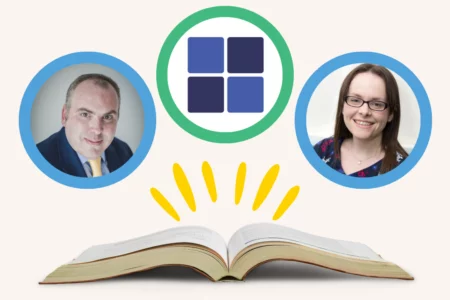Typically our members sign up to The R&D Community to take advantage of our R&D training academy and support service. However, almost all of them told us, in our recent survey, that they strongly identify with our mission – to improve standards in the R&D tax relief industry, through training and self-regulation.
In that regard, Karen’s connection to our mission is only unusual in her enthusiasm!
Why join The R&D Community?
Karen originally met Richard through his former company, WhisperClaims. When he founded The R&D Community, she was one of the members of our early working group, and jumped at the opportunity to join as soon as membership became available. She said:
As an experienced, time served R&D adviser, working in partnership with accountancy practices I was always looking for ways to improve my working knowledge. Advisers were not collaborating and an air of mysticism had been created around R&D tax relief which in my view was being abused. I was mindful, the R&D industry was not regulated and I wanted to stand out from others who were not as experienced or knowledgeable as I.
When I came across WhisperClaims and met Richard, I can remember feeling relieved that I was finally speaking to someone (Richard), who recognised the urgent need for training and self-regulation. I was also motivated to contribute to The R&D Community’s journey from the start and help Richard succeed. At the very least, the training offered by The R&D Community took care of my specific CPD requirements.
Quickly after joining, Karen realised there was much more than just training to benefit from. When we opened our members forum on WhatsApp in March 2022, she joined immediately and became an active participant in many conversations about claims, enquiries, legislative changes and even business strategy and service design.
I found the WhatsApp group a great opportunity to lead by example and I happily shared what I could to help the other members. I wanted to change how R&D advisers interacted, believing that the sum of the many gives a much better result than the sum of one.
Very quickly, other members started sharing their experiences and expertise. I gained more insight and understanding than ever before from real life examples I could relate to and use with my own clients.
This was quite a different experience compared to say LinkedIn, where the tendency is to showcase/sell R&D tax relief services. This salesy element was not present and the WhatsApp group is in my view a safe space to engage with other like minded R&D advisers.
How to make the most of our advanced R&D training courses
Like many of our members, Karen got stuck right into our Introduction to R&D Tax Relief, and Establishing Eligibility courses as soon as she joined. These were really useful to help her understand her own level of knowledge and pick up on areas where she could make improvements to the structure and process of her clients’ claims.
Although I had been preparing claims for many years, I found the lack of feedback and practical guidance from HMRC troublesome. I worried that I couldn’t check my working knowledge against a standard. Finding other quality R&D advisers to have peer to peer discussions with wasn’t possible. Joining the R&D Community was therefore a “no brainer” for me and I jumped at the chance to check out my knowledge, appreciating the “you’ve aced it” remarks everytime I passed a test with 100%!
The practical tips and frameworks provided as an integral part of the training was also invaluable and helped me streamline my claim preparation process and be confident I was using best practice.
After that she then took a more strategic approach, and picked courses which aligned more closely with the claims she was working on at the time. For example, our courses on Subcontracting and Eligibility in Software both gave her specific tips and information, which she could immediately put into practice with clients. This helped to solidify what she’d learned and make sure she would continue to apply those lessons in future.
The most valuable thing I learned was how important it is to make sure that the client understands the definition of R&D tax relief purposes. And especially that they know they’ll be the one who has to back it up to HMRC in an enquiry – because ultimately they’re responsible for the claim.
Before I’d been more tentative in explaining this to clients, because that was just my interpretation of the scheme and the process. But after taking the training I realised I could be much more confident in focussing on that, and spending the time on it, because I had back-up from what Richard had said in the course.
Even though Karen is an experienced advisor, she still found new and useful insights in the courses. Learning new things or getting confirmation of things you thought you already knew, can help build confidence and expertise. Ultimately, this will improve the quality of the service you are offering to your clients.
How did the transition from member to staff come about?
In January this year, we shared a newsletter with our members that outlined our goals for the year – investing more time and effort in building the industry’s first qualification in R&D tax relief in the UK. Karen was inspired by this, as it tied in with her own views on industry self-regulation and high standards.
For some time, I had been frustrated by the fact that almost anyone could set themselves up as an R&D adviser and provide tax advice. For me, this wasn’t ethical and there was no level playing field. I had invested a significant amount of time and money in my accountancy training and continued to uphold the professions standards and comply with the PCRT and AML requirements. Yet other providers in the market, who also were increasing in numbers, held no such qualifications nor were registered for AML and therefore ignored the PCRT.
So when Richard introduced me to his training platform, my mind raced with the possibility of creating the first recognised R&D tax relief qualification. Both accountants and consultants could invest in this training, gain the qualification and be accredited R&D tax advisers. This gold standard could be relied upon by clients and HMRC as a mark of quality. This distinguishing mark of quality would help reduce the amount of abuse by enabling claimants to choose to work with providers who hold this accreditation.
This belief in our vision inspired Karen to reach out to Richard and lend her support. Those conversations then evolved into more concrete plans, and now Karen works with us a day and a half per week. With her experience as an accountant, and in R&D claims, she contributes a lot behind the scenes to our training courses, our articles, and to support members through the R&D Helpline.
What are you excited to be working on for the next few years?
As we expand the team further, Karen is excited to spend more of her time working on training materials for the qualification. She believes firmly in the resources and the qualification we’re working towards creating, and she has bold ambitions for it!
I can see no reason why The R&D Community’s R&D training cannot evolve into an independently assessed qualification, recognised by the CCAB professional bodies, HMRC, NAO and anyone else working in the R&D industry.
Whilst she’s a little bit motivated by the desire to ‘get there first’ along with us, Karen’s real motivation is to see a fairer R&D industry, with higher standards across the board.
If we do our job well, there will be clear standards and documentation for preparing R&D tax relief claims that are accepted as best practice by HMRC and embodied in the PCRT. HMRC compliance checks will no doubt continue but trained and qualified R&D advisers will be well equipped to handle them.
We hope that HMRC themselves will recognise the need for an independent training standard which they can use for their own training needs to enable a consistent application of the R&D definition. Dare I say “we’ll all be singing from the same hymn sheet” and the need for second guessing what HMRC does or does not want will be a thing of the past.
The R&D industry will be in self-regulation mode and HMRC can trust the accredited R&D advisers to dominate the market, stifling any opportunistic rogue advisers and eventually eradicating them altogether. This is not a pipe dream because it is happening; The R&D Community is the biggest single group of like minded R&D advisers. We have nearly 200 individual people already, working towards the same vision of raising standards in the R&D industry. The numbers will increase and this collective voice can make a difference.
Sounds like a good fit?
If you’ve been reading Karen’s story and feel like you share the same challenges and values, we’d love to welcome you to the community too. You can:
- See all the details of what’s included and how much it costs
- Read about everything you need to know before you join
- Address concerns you might have about joining
- Download our prospectus to share with your colleagues
- Sign up for The R&D Review, our free newsletter, for insider insights and updates about new courses
We hope these resources will answer all your questions, but if there’s anything you’d like to discuss, please get in touch and let us know!





